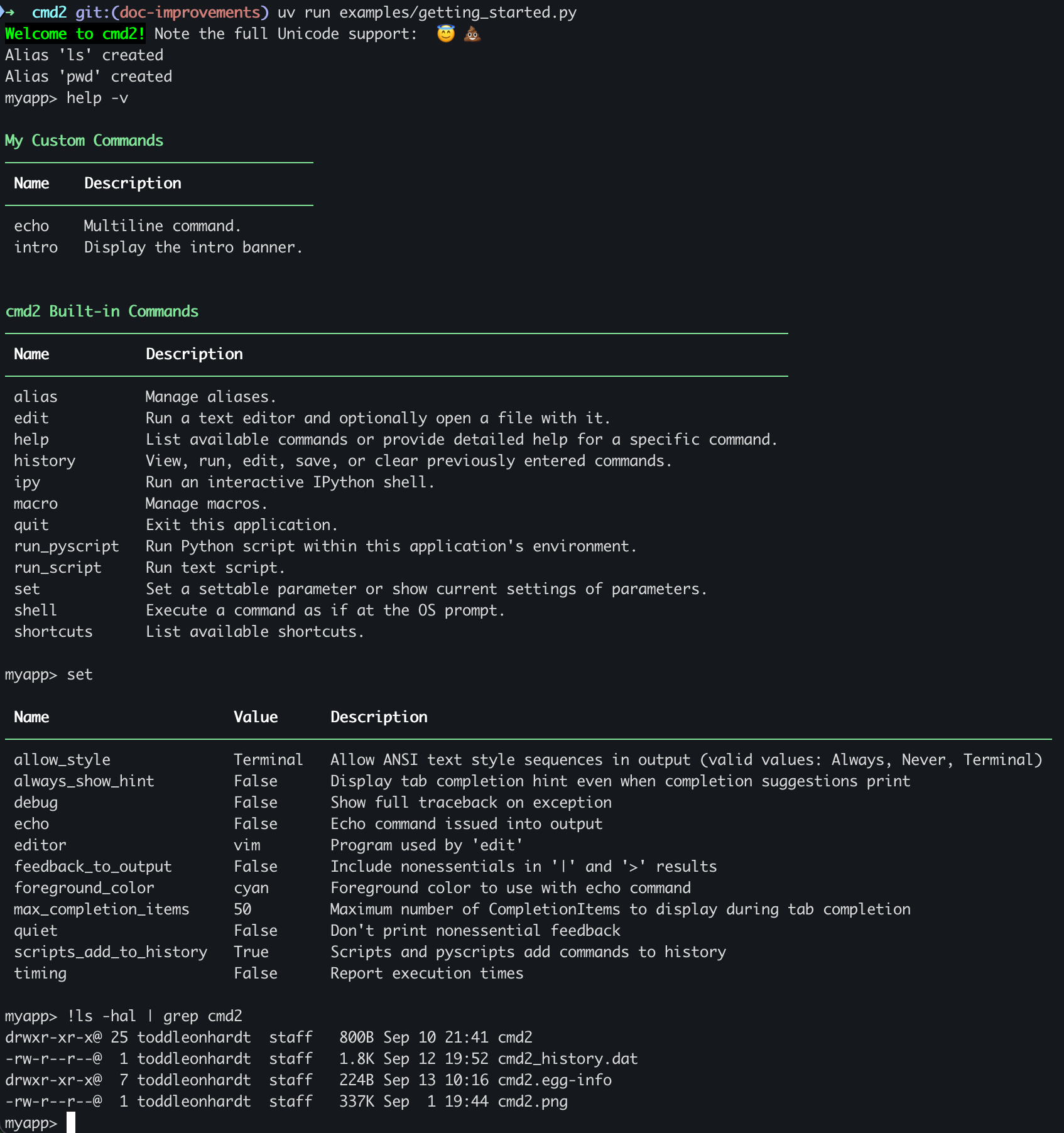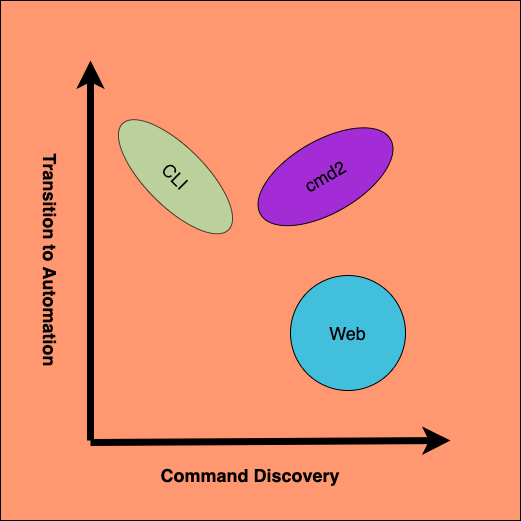Developer's Toolbox • Philosophy • Installation • Documentation • Tutorials • Hello World • Projects using cmd2 •
cmd2 is a tool for building interactive command line applications in Python. Its goal is to make it quick and easy for developers to build feature-rich and user-friendly interactive command line applications. It provides a simple API which is an extension of Python's built-in cmd module. cmd2 provides a wealth of features on top of cmd to make your life easier and eliminates much of the boilerplate code which would be necessary when using cmd.
When creating solutions developers have no shortage of tools to create rich and smart user interfaces.
System administrators have long been duct taping together brittle workflows based on a menagerie of simple command line tools created by strangers on github and the guy down the hall.
Unfortunately, when CLIs become significantly complex the ease of command discoverability tends to fade quickly.
On the other hand, Web and traditional desktop GUIs are first in class when it comes to easily discovering functionality.
The price we pay for beautifully colored displays is complexity required to aggregate disperate applications into larger systems.
cmd2 fills the niche between high ease of command discovery applications and smart workflow automation systems.
The cmd2 framework provides a great mixture of both worlds. Application designers can easily create complex applications and rely on the cmd2 library to offer effortless user facing help and extensive tab completion.
When users become comfortable with functionality, cmd2 turns into a feature rich library enabling a smooth transition to full automation. If designed with enough forethought, a well implemented cmd2 application can serve as a boutique workflow tool. cmd2 pulls off this flexibility based on two pillars of philosophy:
- Tab Completion
- Automation Transition
Deep extensive tab completion and help text generation based on the argparse library create the first pillar of 'ease of command discovery'. The following is a list of features in this category.
- Great tab completion of commands, subcommands, file system paths, and shell commands.
- Custom tab completion for user designed commands via simple function overloading.
- Tab completion from
persistent_history_filesources added with very little friction. - Automatic tab completion of
argparseflags and optional arguments. - Path completion easily enabled.
- When all else fails, custom tab completion based on
choices_providercan fill any gaps.
cmd2 creates the second pillar of 'ease of transition to automation' through alias/macro creation, command line argument parsing and execution of cmd2 scripting.
- Flexible alias and macro creation for quick abstraction of commands.
- Text file scripting of your application with
run_script(@) and_relative_run_script(@@) - Powerful and flexible built-in Python scripting of your application using the
run_pyscriptcommand - Transcripts for use with built-in regression can be automatically generated from
history -torrun_script -t
On all operating systems, the latest stable version of cmd2 can be installed using pip:
pip install -U cmd2cmd2 works with Python 3.8+ on Windows, macOS, and Linux. It is pure Python code with few 3rd-party dependencies.
For information on other installation options, see Installation Instructions in the cmd2 documentation.
The latest documentation for cmd2 can be read online here: https://cmd2.readthedocs.io/en/latest/
It is available in HTML, PDF, and ePub formats.
The best way to learn the cmd2 api is to delve into the example applications located in source under examples.
- PyOhio 2019 presentation:
- Cookiecutter Templates from community
- Basic cookiecutter template for cmd2 application : https://github.com/jayrod/cookiecutter-python-cmd2
- Advanced cookiecutter template with external plugin support : https://github.com/jayrod/cookiecutter-python-cmd2-ext-plug
- cmd2 example applications
- Basic cmd2 examples to demonstrate how to use various features
- Advanced Examples
- More complex examples that demonstrate more featuers about how to put together a complete application
#!/usr/bin/env python
"""A simple cmd2 application."""
import cmd2
class FirstApp(cmd2.Cmd):
"""A simple cmd2 application."""
def do_hello_world(self, _: cmd2.Statement):
self.poutput('Hello World')
if __name__ == '__main__':
import sys
c = FirstApp()
sys.exit(c.cmdloop())If you think you've found a bug, please first read through the open Issues. If you're confident it's a new bug, go ahead and create a new GitHub issue. Be sure to include as much information as possible so we can reproduce the bug. At a minimum, please state the following:
cmd2version- Python version
- OS name and version
- What you did to cause the bug to occur
- Include any traceback or error message associated with the bug
| Application Name | Description | Organization or Author |
|---|---|---|
| CephFS Shell | The Ceph File System, or CephFS, is a POSIX-compliant file system built on top of Ceph’s distributed object store | ceph |
| garak | LLM vulnerability scanner that checks if an LLM can be made to fail in a way we don't want | NVIDIA |
| medusa | Binary instrumentation framework that that automates processes for the dynamic analysis of Android and iOS Applications | Ch0pin |
| InternalBlue | Bluetooth experimentation framework for Broadcom and Cypress chips | Secure Mobile Networking Lab |
| SCCMHunter | A post-ex tool built to streamline identifying, profiling, and attacking SCCM related assets in an Active Directory domain | Garret Foster |
| Unipacker | Automatic and platform-independent unpacker for Windows binaries based on emulation | unipacker |
| Frankenstein | Broadcom and Cypress firmware emulation for fuzzing and further full-stack debugging | Secure Mobile Networking Lab |
| Poseidon | Leverages software-defined networks (SDNs) to acquire and then feed network traffic to a number of machine learning techniques. | Faucet SDN |
| DFTimewolf | A framework for orchestrating forensic collection, processing and data export | log2timeline |
| GAP SDK | SDK for Greenwaves Technologies' GAP8 IoT Application Processor | GreenWaves Technologies |
| REW Sploit | Emulate and Dissect Metasploit Framework (MSF) and other attacks | REW-sploit |
| tomcatmanager | A command line tool and python library for managing a tomcat server | tomcatmanager |
| Falcon Toolkit | Unleash the power of the CrowdStrike Falcon Platform at the CLI | CrowdStrike |
| EXPLIoT | Internet of Things Security Testing and Exploitation framework | expliot_framework |
Possibly defunct but still good examples
| Application Name | Description | Organization or Author |
|---|---|---|
| Katana | Automatic CTF Challenge Solver | John Hammond |
| SatanSword (in Chinese) | Comprehensive Penetration Framework for Red Teaming | Lucifer1993 |
| Jok3r | Network & Web Pentest Automation Framework | Koutto |
| Counterfit | a CLI that provides a generic automation layer for assessing the security of ML models | Microsoft Azure |
| Overlord | Red Teaming Infrastructure Automation | QSecure Labs |
| Automated Reconnaissance Pipeline | An automated target reconnaissance pipeline | epi052 |
| JSShell | An interactive multi-user web JavaScript (JS) shell | Den1al |
| RedShell | An interactive command prompt for red teaming and pentesting | Verizon |
| FLASHMINGO | Automatic analysis of SWF files based on some heuristics. Extensible via plugins. | Mandiant |
| psiTurk | An open platform for science on Amazon Mechanical Turk | NYU Computation and Cognition Lab |
Note: If you have created an application based on cmd2 that you would like us to mention here, please get in touch.





